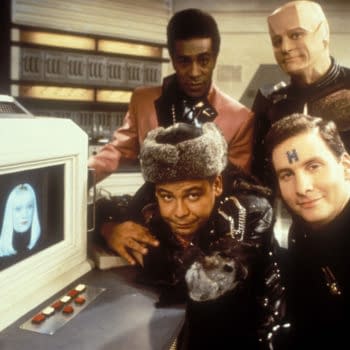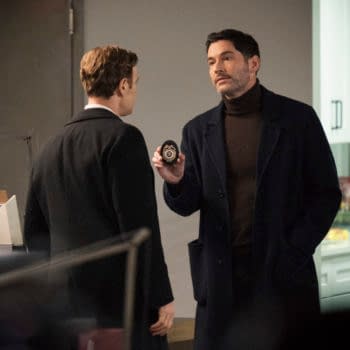Posted in: BBC, Doctor Who, TV | Tagged: bbc, bonnie langford, colin baker, doctor who, Nicola Bryant, russell t davies, sophie aldred, sylvester mccoy
Doctor Who: Respecting Mel, One of the Most Unappreciated Companions
It took decades for BBC's Doctor Who to do right by Bonnie Langford's Melanie "Mel" Bush, one of the classic series' unappreciated companions.
One of the best things about Russell T. Davies returning to run Doctor Who is his active desire to do right by past companions and the actors who played them. The latest example is Melanie Bush, played by Bonnie Langford, who was the Sixth Doctor's (Colin Baker) final companion and the Seventh Doctor's (Sylvester McCoy) first companion. She might be the most underrated and under-appreciated companion of the classic series.

Doctor Who Used to be Bad for Companions
Mel was introduced in what turned out to be Baker's final season as a replacement for Peri (Nicola Bryant), who had probably the worst and most unceremonious departure for a companion in the entire series. She was a 20th Century computer programmer and health freak and a running joke was she kept reminding the Sixth Doctor to drink his carrot juice. Mel, and by association Langford, had the misfortune of starring as the companion in the most reviled season of the classic series of Doctor Who. Fans of the classic series won't stop crapping on that season to this day, but Langford was a trooper, a veteran child actor from musical theatre who did everything the show threw at her without any complaints. As a trained singer, she hit flawless high notes when the script demanded she scream her lungs out when she was attacked by monsters in that common sexist trope for companions since the 1960s.
She also had some of the wackiest storylines in the series, getting attacked by two nice old ladies who turn out to be cannibals, getting between warring teenage gangs in an urban dystopia, getting embroiled in an evil alien army's hunt for an intergalactic princess while trying to protect a busload of time-traveling tourists in Wales, going on a treasure hunt on a space station with the Doctor, a space rogue and a stranded Earth teenager named Ace before deciding to take off with said space rogue. McCoy said he had to fight to get her a goodbye scene for her departure in her final episode – that was how haphazard the writers were in those days, especially with female characters. Mel was possibly the most optimistic companion in the face of intergalactic tinpot dictators – that seemed to be her defining trait that was never commented on because she was often taken for granted. She was a fun and likable foil to the lighter early version of McCoy's Doctor before Ace's darker story complemented the darker and more sinister evolution of the Doctor.
How to Write a Character Better
When Davies brought her back for the 60th Anniversary of Doctor Who, he brought more poignance and pathos to Mel with a single line of dialogue when the Toymaker (Neil Patrick Harris) taunts her as an orphan looking for a place to belong, which immediately explained what she had in common with The Doctor. Langford also brought an older and sadder edge to Mel, but she was still as irrepressible as before. Davies also had her working at a computer for the first time ever! The classic series never showed her near a computer despite introducing her as a computer programmer. In just a few moments, Davies made Mel a more rounded character.
You could say there are no bad characters, only badly written characters. Davies happens to be the writer who dug deep into what was already inherent in Mel to find what makes her tick as a specific person rather than a trope or a stereotype. You could probably do that with all the neglected companions in Doctor Who. It seems Davies' mission with the Whoniverse is to rehabilitate and redeem all the companions who were done dirty. It's good for Doctor Who.














